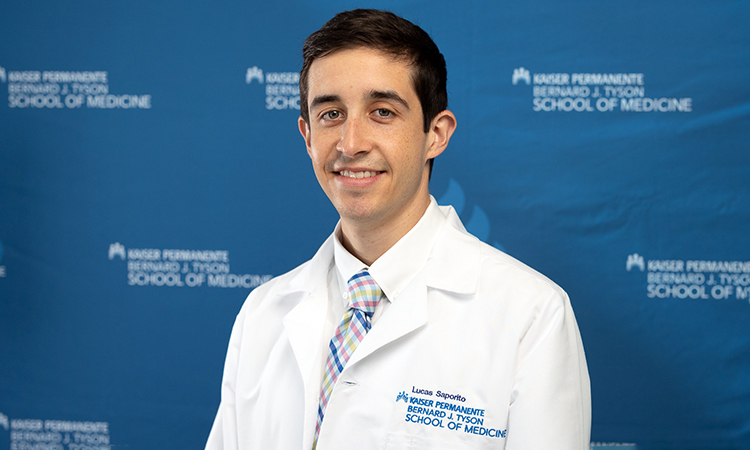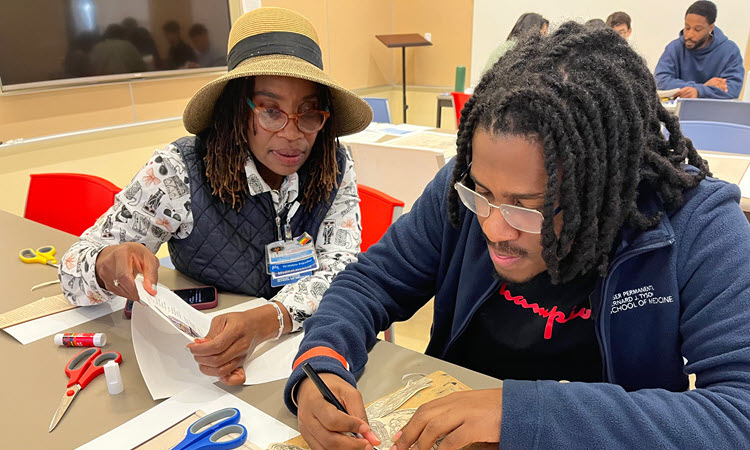Kaiser Permanente Bernard J. Tyson School of Medicine (KPSOM) student Lucas Saporito gave an oral presentation on “E-biopsy: Addressing missed diagnoses of ectopic pregnancies through decision support enhancements” at the Society to Improve Diagnosis in Medicine 2022 conference in Minneapolis on October 17. In preparation for his talk, Saporito worked closely with mentors Ali Ghobadi, MD, CPPS, Assistant Professor of Clinical Science; Kerry Litman, MD, CPPS, Assistant Professor of Clinical Science; and Michael Kanter, MD, CPPS, Chair of Clinical Science. In the following short interview, Saporito talks about his interest in e-biopsy research and systems, his oral presentation, and his collaboration with Drs. Ghobadi, Litman, and Kanter.
How did your oral presentation at the Society to Improve Diagnosis in Medicine 2022 conference in Minneapolis come to fruition, and how did it go?
Ever since I joined the e-biopsy research team, Drs. Kerry Litman, Ali Ghobadi and Michael Kanter allowed and encouraged me to participate in every step of e-biopsy’s research and systems improvement work. The team was already planning on presenting their ectopic pregnancy project at the Society Improve Diagnosis in Medicine (SIDM) conference in Minneapolis, so because my scholarly project is focused on their ectopic pregnancy project, they gave me the opportunity to present on the team’s behalf. I was eager to … get experience presenting at a large conference and to learn more about how systems can be improved to make healthcare safer and more equitable. I was quite nervous standing up at the podium before my presentation, but once I got a couple [of] slides in, I relaxed and was able to share the work we’re doing to improve ectopic pregnancy diagnosis.
You discussed e-biopsy and addressed missed diagnoses of ectopic pregnancies through decision support enhancements. Can you explain more about this topic and why it is important?
E-biopsy chose to study ectopic pregnancies for a couple [of] different reasons. Firstly, a delay in diagnosis can lead to increased morbidity and mortality. Secondly, ectopic pregnancies are subject to diagnostic error due to the non-specific symptoms that patients normally present with. Thirdly, patients with ectopic pregnancies may be seen in a wide range of contexts (ER, urgent care, outpatient clinic) and by a wide range of providers (OB/GYN, ER physician, primary care physician). All these factors can lead to delays in diagnosis and adverse outcomes for patients, making it a great diagnosis to study and learn how to improve our diagnostic processes and patient care.
Describe your collaboration with Drs. Ali Ghobadi, Kerry Litman, and Michael Kanter. What role did each person play in preparation for your presentation?
All of my advisers were with me every step of the way in preparing for this presentation. I had a pretty good understanding of the entire ectopic pregnancy project from start to finish because they got me involved in all parts of the e-biopsy workflow. Then, because Dr. Kanter has presented many times at this conference, he gave me some good advice on how to structure my presentation, making sure both patients [and] providers would be able to understand e-biopsy’s work. All three proofread my presentation, listened to me present a practice run, and provided feedback so that I knew what I needed to do to succeed. I had great support from others as well, including Maverick Au, e-biopsy’s Project Manager, and the rest of the Kaiser Permanente cohort that attended the conference.
Why was it important to you to present on this particular subject matter?
One way to look at it is that we get to share our research with others so that they can learn from us. We can be an example to other health organizations as to how to translate quality improvement research into systems interventions that hopefully improve diagnosis. However, I also learned at this conference that the education doesn’t have to be unidirectional. I had a couple [of] great conversations with other conference attendees who shared their insights about e-biopsy’s ectopic pregnancy work. These conversations helped me see some difficulties and potential solutions that I hadn’t thought of regarding our implementation work and the long-term efficacy of our systems interventions. Therefore, I think going to these conferences is a great opportunity to disseminate research, knowledge, and strategies of how health systems have improved diagnosis and patient care so that other institutions may follow suit.



